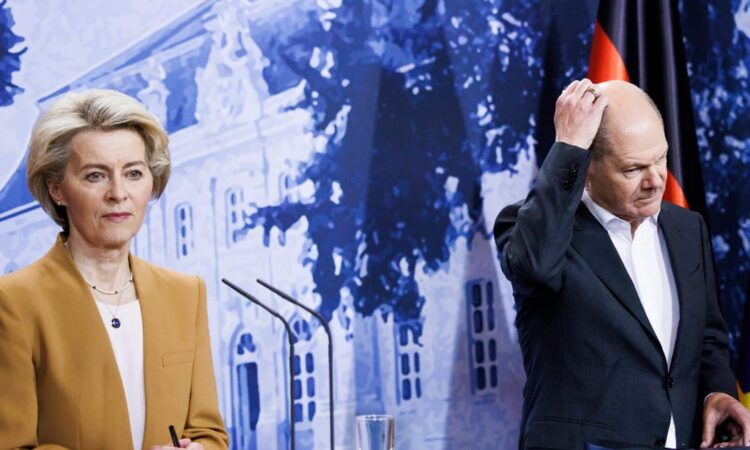
Miguel Otero-Iglesias a senior analyst at the Elcano Royal Institute in Madrid.
Faced with a choice between successfully completing the green transition, effectively achieving economic security and aiming for fiscal discipline, the European Union is confronted with a new trilemma — and it cannot accomplish all three.
But while Germany — with its debt brake, designed to limit budget deficits, and the November ruling from its Constitutional Court, jeopardizing its green transition funding — appears to be tightly embracing the latter option of fiscal discipline, this is a strategic mistake.
The green transition and economic security are complimentary phenomena that can create a positive feedback loop. And Europe needs to realize this.
The green transition is an absolute necessity — both at the European and global level. And given available scientific evidence, the acceleration of its pace is totally justified. It is absolutely imperative we reach 2050 with net-zero carbon emissions if we want to avoid the massive disruptions associated with global warming. And according to the newly created EU Scientific Advisory Board for Climate Change, this means emissions need to be reduced by a stunning 95 percent from now until 2040.
Of course, such a relatively fast transition will come at a cost.
If distributed unfairly, macroeconomic adjustments can result in social or political unrest. And with many far-right parties already fiercely critiquing the Green New Deal and businesses denouncing the bloc’s green ambitions as going too far and undermining their competitiveness vis-à-vis the United States and China, we have a warning to heed.
Thus, in the current geopolitical context of great power rivalry, it appears that increasing the EU’s economic security is unavoidable. Recent developments — including the extraterritorial sanctions issued against European companies by former U.S. President Donald Trump’s administration, Russia’s war against Ukraine and weaponization of its gas sales, as well as China’s coercive measures against Lithuania and its possible invasion of Taiwan — have convinced most EU capitals, and certainly the European Commission, that de-risking and re-shoring are both necessary.
Industrial policy is back, and we have all become more dirigiste.
The new slogan for the EU and its member countries is to “protect and promote” their industrial capacities. And as a recent paper by the Spanish Presidency of the EU Council demonstrates, this implies further public investment to achieve economic security in the fields of energy, technology, health and food provision — as well as in the more contentious field of military security, particularly since Trump threatened to abandon NATO in the past and might do so again if reelected.
And none of this will be cheap. We will be confronted with a steep cost whether this new industrial policy is horizontal — focused on completing the single market and improving the EU’s human and physical capital — or whether it is vertical, with focused investments increasing the production of semiconductors, quantum computing, artificial intelligence and biotechnology. (Of course, the same goes for defense capabilities.)
This then brings us to the trilemma’s third prong of fiscal discipline, as EU member countries are currently negotiating fiscal rules for this new era.
All agree that fiscal sustainability is a priority if the bloc is to stay together, and the new consensus is that the fiscal adjustments need to be country specific. Where there seems to be disagreement, however, is in the pace of the adjustment and whether it should be automatic, based on set quantitative reductions.
Germany, in particular, favors this approach, as it has a very strict domestic debt-brake framework. And the country, which is in a recession, is presently debating how to cut its public budget.
Let’s contrast this with the U.S. With its Inflation Reduction Act and unlimited tax breaks for green technologies that are (mostly) produced at home, it seems Washington is determined to pursue the trilemma’s first two objectives — the green transition and economic security — while dropping fiscal discipline (at least for now). As a matter of fact, the U.S. fiscal deficit will be north of 6 percent of GDP this year.
These are, indeed, two opposite strategies. And for now, it looks like the U.S. is winning.
Naturally, we know the U.S. has an advantage. It issues the main international currency and, therefore, enjoys the “exorbitant privilege” of not having to be as fiscally disciplined as other countries. But the EU issues the second most used international currency and should use some of its privilege too.
For example, NextGenerationEU — the bloc’s post-pandemic recovery plan — is the embryo of a centralized fiscal capacity, but it is divided into national approaches. The next step now needs to be developing a European industrial and tech strategy worthy of that name, and with central resources to secure a level playing field in the single market.
Such a strategy would allow EU member countries to aim toward achieving all three objectives. Plus, countries with reduced fiscal room and in need of lowering their national deficits — like Spain or Italy — already benefit from NextGenerationEU public funds to invest in their green transition and economic security.
Of course, there is no free lunch. The debt issued for the deployment of NextGenerationEU — and, hopefully, for the continuous fiscal capacity needed to compete with the U.S. and China — will need to be repaid. This is why the EU debate on own resources needs to be concluded as soon as possible, as it will push the yields of EU debt closer to German and French levels.
Overall, the climate, geopolitical and geo-economic pressures of the present and future demand higher public investment to provide the necessary public goods across the EU.
The sooner Germany and other European publics are convinced of this, the better.






